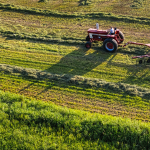All professional advisers are now looking at the aftermath of last week’s budget. It seems to be particularly hard on our farming clients with the plan to remove Agricultural Property Relief as we know it from Inheritance Tax. Working farmers have been able to claim 100% APR on the death. One of the aims of APR was to ensure that family farms remained as such without the need for them to be sold to pay inheritance tax.
Under the new regime only the first £1,000,000 will be tax free with the remaining 50% of agricultural property taxed at 40%. To many people the figure of £1,000,000, understandably, seems quite a lot of money, but in farming terms this can be easily reached. In Cheshire, one of the counties, where Oakwood practises, this could be as little as 65 acres of bare land or a farm house with buildings and just a few acres.
There are many misconceptions about Agricultural Property Relief, but it is aimed at the working farmer; however, an exception to that is that land owned but let on a Farm Business Tenancy agreement could qualify for APR whilst land let on an old style tenancy (Agricultural Holdings Act) qualified for 50% APR relief.
Since the Agricultural Tenancies Act 1995 (which brought us FBTs) was introduced there have been stories of non farmers buying land specifically to gain the 100% APR, indeed we’ve acted for farmers in buying land specifically for that purpose. There is of course the moral question as to whether that is right and within the spirit of the law, despite being perfectly legal to do. It is perhaps worth commenting that from a practical point of view these land owners do enable farming to continue and, in my experience, many have little interest in the rent they charge to their tenants; their investment is in the APR saving. It therefore remains to be seen as to whether any such land owners will sell their holdings noting they still get 50% relief or look to put rents up to make the investment more profitable.
Returning to the working farmer, their concern is devastating and we’ve been talking to farmers who are clearly very upset about the change and worried about their future.
Unfortunately, farmers are not always the best at taking professional advice and are often guided in such matters by what happened when their dad died, what happened when old Sid down the road died and what they heard in the local pub. This is, of course, perhaps an unfair generalisation, but it does highlight the need for farmers to take specialist advice relating to their own situation. Every family situation will be different.
It is likely that with some strategic planning, involving a valuer, a solicitor, a tax adviser and an accountant, many farmers will be able to mitigate the potential tax burden. This could be by use of some judicious succession planning, perhaps the use of trusts or other such vehicles.
It is often said that inheritance tax is a voluntary tax as it can be planned for. That is, of course, not entirely true as there are many factors that can conspire against even the best planned family situation. Issues such as premature death e.g. dying before a potentially exempt transfer has worked through the system, dying out of turn e.g. son or daughter dying before their parents or several members of a family dying together, perhaps in an accident. However, these are not reasons to avoid tax planning and at Oakwood we believe there has never been a more important time for farmers and land owners to consider their situation.
At Oakwood we would be pleased to provide farmers and land owners with a free initial review by telephone or zoom meeting to get the ball rolling with their planning. We work with leading solicitors and accountants across the northwest / North Wales and could introduce appropriate professionals to help our clients.






